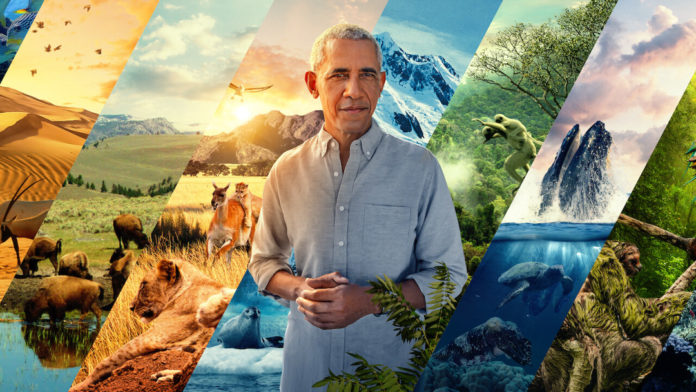When Netflix announced its new series Our Great National Parks, I was unenthused. Don’t get me wrong — I was raised on wildlife documentaries, but with almost forty years of watching and new content released every year, it’s hard to get excited about the next iteration. Our Great National Parks does feel a little special, though. It’s the first series of this kind in a long while to leave me a bit more hopeful than I’d been going in, and that’s something.
In 2019, Netflix successfully brought aboard Sir David Attenborough for a BBC-inspired exclusive, Our Planet, which garnered critical acclaim for its spectacular visuals, top-notch narration, and dire warnings. But Netflix has a looming problem to address, because Attenborough, who turns 96 this May, can’t remain the de facto lead forever. This brings us to Our Great National Parks’ host, Barack Obama. The 44th POTUS is arguably one of our generation’s greatest orators, and his tenor and cadence are instantly recognizable on this journey through some of the world’s most important protected wildernesses — so how does he fare?
Admittedly, it’s an impossible task to unseat Attenborough, who’s become synonymous with nature and conservation documentaries, but the former Prez does an admirable job, shifting his tone from thoughtful, to grim, to downright jolly at times. Like Attenborough, Obama speaks from a deep connection to the material, conveying a sense of reverence that’s typically absent from celebrity-hosted fare pulled from a Hollywood grab-bag. When Obama discusses the importance of designating national parks, it feels prescient from a man who held the Oval Office and was tasked with their protection.
Narration, however, isn’t the only ingredient that goes into a nature documentary casserole, and again, the bar is already set incredibly high. The reception of these series also depends on narrative, visuals, and score, and while Parks succeeds on all fronts, it doesn’t quite reach the high water marks of some of its predecessors.
To be clear, Parks is stunning, but after viewing it on a smartphone, a laptop, and a 4K big-screen, I can tell you — size matters. The show is by no means unwatchable on lesser devices, but Parks was meant to be absorbed, not just seen. The towering Patagonian spires and vast African grasslands just aren’t as imposing and majestic when you’re staring at a screen in the palm of your hand. A lack of immersion also makes it tough to connect to the animals, and that connection is important. Their subtle expressions, so evocative on a big screen, can get lost on a four-inch display. I found that I was so much more emotionally invested when viewing on a proper television, that I went back and re-watched the first and second episodes that I’d initially viewed on other devices.
Parks also sounds great. Composed by David Schweitzer, the soundtrack focuses on one orchestral centerpiece that acts as a throughline for the series. Many of the landscapes and wild creatures have their own pieces, but each feels connected through the main track that thematically ties everything together. The playful flutes and violins give way to sweeping and soulful cellos and horns that I’m not adept enough to properly analyze. What I can say is that good music makes you feel what it wants you to feel, and in that, Schweitzer was successful.
Where Parks truly succeeds, in my opinion, is its call-to-action. One thing it does better than some of its predecessors is humanize its cast. While it’s common to anthropomorphize these characters, Parks puts a premium on building an emotional connection with the audience. Whether it’s a sea otter with her newborn, a sloth basking in the sun, a puma reuniting with her daughter, or a macaque taking a deer for a joyride, the directors are intent on illustrating just how very alike we are. The universality of our needs — to find companionship, to seek safety and shelter, and to feed and protect our young — represents a deeply rooted kinship with our distant (and not so distant) relatives. By tapping into our compassion rather than our guilt, protecting these spaces feels more like a current duty than a missed opportunity.
Ultimately, Our Great National Parks makes conservation compelling and attainable, something sorely needed right now. Often, I’m convinced that humanity is simply not equipped to address climate change, habitat destruction, and extinction with the urgency and effort required. I still am — but this series gave me a little more hope than I had before. Passionate, driven individuals working in small collectives can, and do, affect real change when it’s focused and directed on attainable goals, and protecting our wild spaces is one of those goals. While it’s not the best of the breed, it’s still a fantastic specimen and, hopefully, not the last of its kind.
Long ago, when DeLoreans roamed the earth, Brad was born. In accordance with the times, he was raised in the wild every afternoon and weekend until dusk, never becoming so feral that he neglected to rewind his VHS rentals. His historical focus has assured him that civilization peaked with The Simpsons in the mid 90s. When not disappointing his parents, Brad spends his time with his dogs, regretting he didn’t learn typing in high school.



